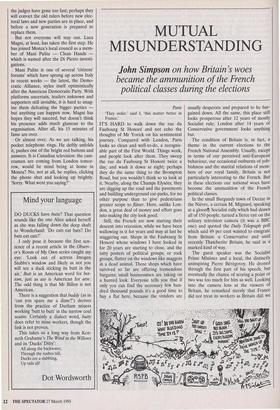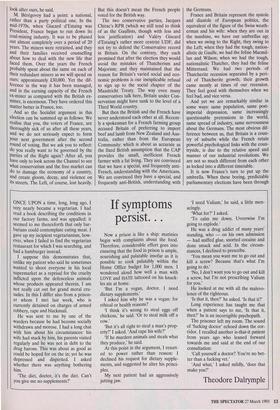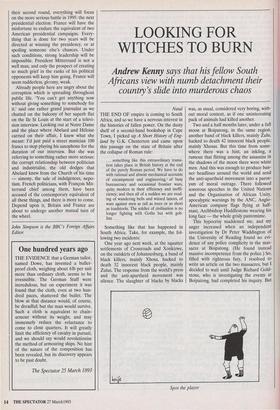MUTUAL MISUNDERSTANDING
John Simpson on how Britain's woes
became the ammunition of the French political classes during the elections
Paris 'They order,' said I, 'this matter better in France.'
IT'S HARD to walk down the rue du Faubourg St Honore and not echo the thoughts of Mr Yorick on his sentimental journey. Compared with London, Paris looks so clean and well-to-do, a recognis- able part of the First World. Things work, and people look after them. They sweep the rue du Faubourg St Honore twice a day, and wash it down at night; perhaps they do the same thing to the Brompton Road, but you wouldn't think so to look at it. Nearby, along the Champs Elysees, they are digging up the road and the pavements and building underground car-parks, for no other purpose than to give pedestrians greater scope to 'Tarter. Here, unlike Lon- don, a great deal of money and effort goes into making the city look good.
Still, the French are now starting their descent into recession, while we have been wallowing in it for years and may at last be staggering out. Shops in the Faubourg St Honore whose windows I have looked in for 20 years are starting to close, and the tatty posters of political groups, or rock groups, flutter on the windows like maggots in a dead animal. Those shops which have survived so far are offering tremendous bargains; small businessmen are taking on a hunted look. Everyone tells you that if only you can find the necessary few hun- dred thousand pounds it's a good time to buy a flat here, because the vendors are usually desperate and prepared to be bar- gained down. All the same, this place still looks prosperous after 12 years of mostly Socialist rule; London after 14 years of Conservative government looks anything but.
The condition of Britain is, in fact, a theme in the current elections to the French National Assembly. Usually, except in terms of our perceived anti-European behaviour, our occasional outbursts of yob- bishness and the marital relations of mem- bers of our royal family, Britain is not particularly interesting to the French. But in these elections our national woes have become the ammunition of the French political classes.
In the small Burgundy town of Decize in the Nievre, a certain M. Mignard, speaking at a glooml, Socialist rally which had drawn all of 150 people, turned a fierce eye on the solitary television camera (it was a BBC one) and quoted the Daily Telegraph poll which said 49 per cent wanted to emigrate from Britain: a Conservative and until recently Thatcherite Britain, he said in a marked kind of way.
The guest speaker was the Socialist Prime Minister and a local, the distinctly uninspiring Pierre Beregovoy. He droned through the first part of his speech, but eventually the chance of scoring a point or two was too much for him as well. Looking into the camera lens at the viewers of Britain, he remarked sternly that France did not treat its workers as Britain did: we look after ours, he said.
M. Beregovoy had a point: a national, rather than a party political one. In the mid-1970s, when Giscard d'Estaing was President, France began to run down its coal-mining industry. It was to be phased out almost completely over a period of 20 years. The miners were retrained, and they and their families received counselling about how to deal with the new life that faced them. Over the years the French Probably spent about the same on each of their redundant miners as we will spend on ours: approximately f_30,000. Yet the dif- ference in the way it has been managed, and in the earning capacity of the French ex-miner as compared with the British ex- miner, is enormous. They have ordered this matter better in France, too.
And so the Socialist argument in this election can be summed up as follows: We realise that you, the voters of France, are thoroughly sick of us after all these years, and we do not seriously expect to form Your next government after the second round of voting. But we ask you to reflect: do you really want to be governed by the Parties of the Right again? After all, you have only to look across the Channel to see What conservatism and the free market can do to damage the economy of a country, and create gloom, decay, and violence on its streets. The Left, of course, lost heavily. But this doesn't mean the French people voted for the British way.
The two conservative parties, Jacques Chirac's RPR (which we still tend to think of as the Gaullists, though with less and less justification) and Valery Giscard d'Estaing's rather more centrist UDF, did not try to defend the Conservative record in Britain. On the contrary, they each promised that after the election they would avoid the mistakes of Thatcherism and Majorism; and they maintained that the reason for Britain's varied social and eco- nomic problems is our inexplicable refusal to sign up to the social chapter of the Maastricht Treaty. The way even many conservatives talk here, Britain under Con- servatism might have sunk to the level of a Third World country.
But then the British and the French have never understood each other at all. Recent- ly a spokesman for a French farming group accused Britain of preferring to import beef and lamb from New Zealand and Aus- tralia, rather than from the European Community: which is about as accurate as the fixed British assumption that the CAP provides the small, inefficient French farmer with a fat living. They are convinced that we have a special, and frequently anti- French, understanding with the Americans. We are convinced they have a special, and frequently anti-British, understanding with the Germans.
France and Britain represent the systole and diastole of European politics, the equivalent of the figure of the Swiss weath- erman and his wife: when they are out in the sunshine, we have our umbrellas up; when we swing to the Right, they swing to the Left; when they had the tough, nation- alistic de Gaulle, we had the feline Macmil- lan and Wilson; when we had the tough, nationalistic Thatcher, they had the feline Mitterrand. We had two periods of Thatcherite recession separated by a peri- od of Thatcherite growth; their growth came mostly at times of our recession. They feel good with themselves when we feel bad, and vice versa.
And yet we are remarkably similar in some ways: same population, same post- imperial depression, same increasingly questionable pretensions in the world, same spread of industry, same nervousness about the Germans. The most obvious dif- ference between us, that Britain is a coun- try of suburbs while the French retain powerful psychological links with the coun- tryside, is due to the relative speed and manner of our industrial revolutions. We are not so much different from each other as locked into a different timetable.
It is now France's turn to put up the umbrella. When these boring, predictable parliamentary elections have been through their second round, everything will focus on the more serious battle in 1995: the next presidential election. France will have the misfortune to endure the equivalent of two American presidential campaigns. Every- thing that is done for two years will be directed at winning the presidency, or at spoiling someone else's chances. Under such conditions, strong leadership will be impossible. President Mitterrand is not a well man, and only the prospect of creating so much grief in the ranks of his political opponents will keep him going. France will seem rudderless, gloomy, weak.
Already people here are angry about the corruption which is spreading throughout public life. 'You can't get anything now without giving something to somebody for it,' said one rather grand journalist as we chatted on the balcony of her superb flat on the Ile St Louis at the start of a televi- sion interview. Looking out at Notre Dame and the place where Abelard and Heloise carried on their affair, I knew what she meant: I'd just paid a street musician 100 francs to stop playing his saxophone for the duration of our interview. But she was referring to something rather more serious: the corrupt relationship between politician and industrialist, the old dodges that Abelard knew from the Church of his time — simony, the sale of indulgences, nepo- tism. French politicians, with Francois Mit- terrand chief among them, have been accused of the contemporary equivalent of all these things, and there is more to come. Depend upon it, Britain and France are about to undergo another mutual turn of the wheel.
John Simpson is the BBC's Foreign Affairs Editor.




























































 Previous page
Previous page